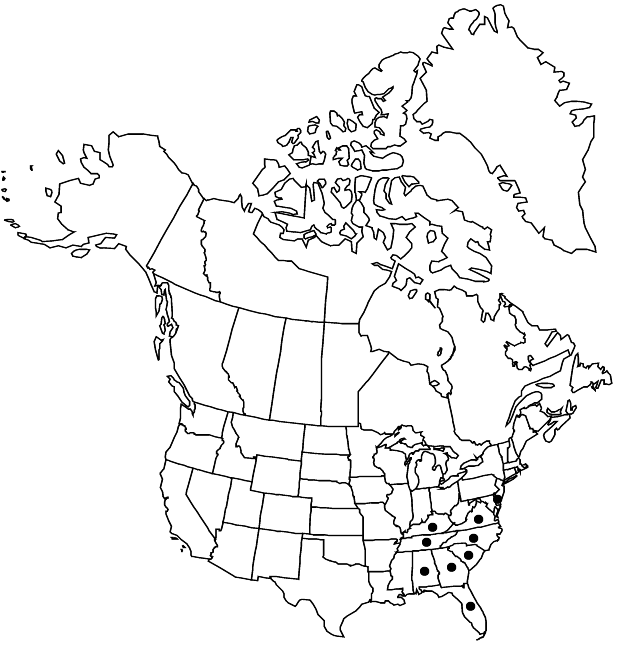Difference between revisions of "Monotropsis odorata"
in S. Elliott, Sketch Bot. S. Carolina 1: 479. 1817 ,.
FNA>Volume Importer |
FNA>Volume Importer |
||
| Line 11: | Line 11: | ||
|name=Monotropsis lehmaniae | |name=Monotropsis lehmaniae | ||
|authority=Burnham | |authority=Burnham | ||
| − | }}{{Treatment/ID/Synonym | + | }} {{Treatment/ID/Synonym |
|name=Monotropsis odorata var. lehmaniae | |name=Monotropsis odorata var. lehmaniae | ||
|authority=(Burnham) H. E. Ahles | |authority=(Burnham) H. E. Ahles | ||
| − | }}{{Treatment/ID/Synonym | + | }} {{Treatment/ID/Synonym |
|name=Monotropsis reynoldsiae | |name=Monotropsis reynoldsiae | ||
|authority=unknown | |authority=unknown | ||
| Line 32: | Line 32: | ||
|elevation=0-1400 m | |elevation=0-1400 m | ||
|distribution=Ala.;Del.;Fla.;Ga.;Ky.;N.C.;S.C.;Tenn.;Va. | |distribution=Ala.;Del.;Fla.;Ga.;Ky.;N.C.;S.C.;Tenn.;Va. | ||
| − | |discussion=<p>Other taxa of Monotropoideae also flower in the fall (e.g., Monotropa hypopitys). There are often associated differences in proportions of flower parts; usually inflorescences and flowers are smaller. The fall-flowering form of Monotropsis odorata in the Carolinas has been called var. lehmaniae. However, H. E. Ahles, who made that combination, later (1967) determined that it is a seasonal phase of M. odorata, a determination supported by R. L. Wilbur (1970b). In Florida, the fall–winter-flowering form of M. odorata has been called M. reynoldsiae. The commonly used distinguishing features are the sizes of the inflorescences and flowers, and the proportion of the calyx to the corolla. These features are variable to a degree in M. odorata, and a range may be seen even in the specimens comprising the holotype of M. reynoldsiae at Gray Herbarium.</p> | + | |discussion=<p>Other taxa of Monotropoideae also flower in the fall (e.g., <i>Monotropa hypopitys</i>). There are often associated differences in proportions of flower parts; usually inflorescences and flowers are smaller. The fall-flowering form of <i>Monotropsis odorata</i> in the Carolinas has been called var. lehmaniae. However, H. E. Ahles, who made that combination, later (1967) determined that it is a seasonal phase of <i>M. odorata</i>, a determination supported by R. L. Wilbur (1970b). In Florida, the fall–winter-flowering form of <i>M. odorata</i> has been called M. reynoldsiae. The commonly used distinguishing features are the sizes of the inflorescences and flowers, and the proportion of the calyx to the corolla. These features are variable to a degree in <i>M. odorata</i>, and a range may be seen even in the specimens comprising the holotype of M. reynoldsiae at Gray Herbarium.</p> |
|tables= | |tables= | ||
|references= | |references= | ||
| Line 56: | Line 56: | ||
|publication year= | |publication year= | ||
|special status= | |special status= | ||
| − | |source xml=https://jpend@bitbucket.org/aafc-mbb/fna-data-curation.git/src/ | + | |source xml=https://jpend@bitbucket.org/aafc-mbb/fna-data-curation.git/src/8f726806613d60c220dc4493de13607dd3150896/coarse_grained_fna_xml/V8/V8_744.xml |
|subfamily=Ericaceae subfam. Monotropoideae | |subfamily=Ericaceae subfam. Monotropoideae | ||
|genus=Monotropsis | |genus=Monotropsis | ||
Revision as of 19:08, 18 September 2019
Inflorescences 4–13 cm; bracts 5–11 × 2–8 mm, scarious at maturity. Flowers: sepals 1.5–10 × 0.5–4 mm; corolla 5–10 mm, lobes lanceolate-ovate, base saccate, apex rounded to acute; stamens 3–6 mm; anthers inverted at anthesis, 0.5 mm diam.; ovary 1–4 × 1–3 mm, glabrous; style 2–4 × 0.5–1.5 mm; stigma whitish to dull purplish, 1 mm diam. Berries 4–8 mm diam. Seeds to 0.6–1 mm diam.
Phenology: Flowering late early spring–early summer(-winter).
Habitat: Mixed-deciduous or coniferous forests
Elevation: 0-1400 m
Distribution

Ala., Del., Fla., Ga., Ky., N.C., S.C., Tenn., Va.
Discussion
Other taxa of Monotropoideae also flower in the fall (e.g., Monotropa hypopitys). There are often associated differences in proportions of flower parts; usually inflorescences and flowers are smaller. The fall-flowering form of Monotropsis odorata in the Carolinas has been called var. lehmaniae. However, H. E. Ahles, who made that combination, later (1967) determined that it is a seasonal phase of M. odorata, a determination supported by R. L. Wilbur (1970b). In Florida, the fall–winter-flowering form of M. odorata has been called M. reynoldsiae. The commonly used distinguishing features are the sizes of the inflorescences and flowers, and the proportion of the calyx to the corolla. These features are variable to a degree in M. odorata, and a range may be seen even in the specimens comprising the holotype of M. reynoldsiae at Gray Herbarium.
Selected References
None.
